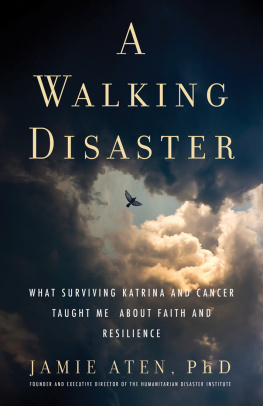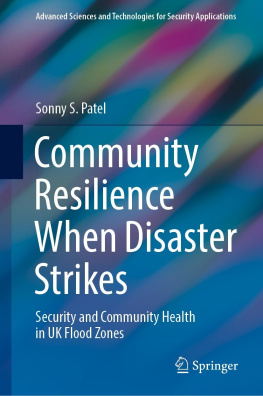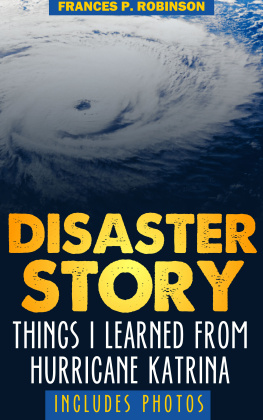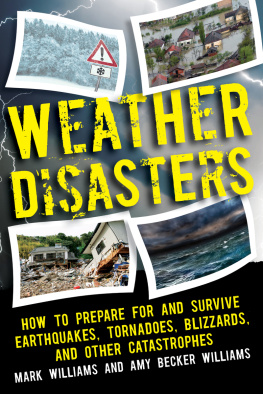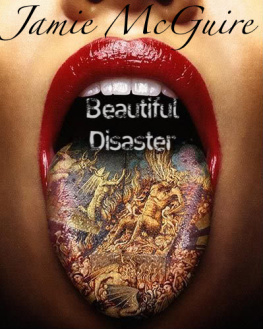Jamie Aten - A Walking Disaster: What Surviving Katrina and Cancer Taught Me about Faith and Resilience
Here you can read online Jamie Aten - A Walking Disaster: What Surviving Katrina and Cancer Taught Me about Faith and Resilience full text of the book (entire story) in english for free. Download pdf and epub, get meaning, cover and reviews about this ebook. year: 2019, publisher: Templeton Press, genre: Religion. Description of the work, (preface) as well as reviews are available. Best literature library LitArk.com created for fans of good reading and offers a wide selection of genres:
Romance novel
Science fiction
Adventure
Detective
Science
History
Home and family
Prose
Art
Politics
Computer
Non-fiction
Religion
Business
Children
Humor
Choose a favorite category and find really read worthwhile books. Enjoy immersion in the world of imagination, feel the emotions of the characters or learn something new for yourself, make an fascinating discovery.
- Book:A Walking Disaster: What Surviving Katrina and Cancer Taught Me about Faith and Resilience
- Author:
- Publisher:Templeton Press
- Genre:
- Year:2019
- Rating:4 / 5
- Favourites:Add to favourites
- Your mark:
A Walking Disaster: What Surviving Katrina and Cancer Taught Me about Faith and Resilience: summary, description and annotation
We offer to read an annotation, description, summary or preface (depends on what the author of the book "A Walking Disaster: What Surviving Katrina and Cancer Taught Me about Faith and Resilience" wrote himself). If you haven't found the necessary information about the book — write in the comments, we will try to find it.
Is there a meaning to our suffering? Is hope realistic when tragedy befalls us? Is a return to normalcy possible after our life is uprooted by catastrophe? These are the questions that disaster psychologist Dr. Jamie Aten wrestled with when he was diagnosed with Stage IV colon cancer. In this gripping memoir, Aten shares the life-affirming and faith-renewing insights that he discovered during his tumultuous struggle against the disease.
Atens journey began in 2005 when Hur ricane Katrina struck his community. After witnessing the devastation wrought by the storm, he dedicated his career to investigat ing how people respond to and recover from all manner of disasters. He studied disaster zones around the globe and founded the Humanitarian Disaster Institute at Wheaton College. His expertise, however, was little comfort when a fateful visit with his oncolo gist revealed advanced and aggressive cancer. Youre in for your own personal disaster was his doctors prognosis.
Thrust into a battle for his life, with cancer cells and chemotherapy ravaging his body, Aten found his professional interest taking on new meaning. His ordeal taught him firsthand how we can sustain ourselves when burdened with seemingly unbear able suffering. Some of his counterintuitive insights include: to find hope, be cautious of optimism; when you want help the least is when you need it most; and spiritual surren der, rather than a passive act, is instead an act of profound courage.
This last point speaks to the element of grace in Dr. Atens story. As he struggled to understand the significance of his suffering, he found himself examining his Christian faith down to its bedrock and learned to experience the redeeming presence of God in his life. Dr. Aten has a natural exuberance that shines through his writing. Infused with his compassionate voice and humanitarian concern,
A Walking Disaster is ultimately an inspirational story about the power of the human spirit to endure trauma with cour age.
Jamie Aten: author's other books
Who wrote A Walking Disaster: What Surviving Katrina and Cancer Taught Me about Faith and Resilience? Find out the surname, the name of the author of the book and a list of all author's works by series.

